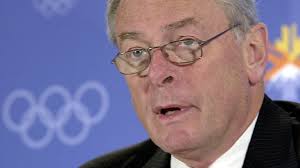By David Owen
November 10 – FIFA faces the prospect of having to ship anti-doping samples outside the host-country for analysis for a second World Cup running in 2018, as part of the possible fallout from this week’s devastating report into alleged doping practices in Russia.
The Moscow anti-doping laboratory comes in for scathing criticism in the report by a World Anti-Doping Agency (WADA) Independent Commission chaired by Richard Pound (pictured), the Canadian International Olympic Committee (IOC) member who is a former WADA President.
The 300-plus page report recommends that WADA withdraw its accreditation of the Moscow laboratory “as soon as possible”, alleging that the facility is “unable to act independently”.
Last year, samples collected from World Cup players had to be analysed outside Brazil, at a laboratory in the Swiss city of Lausanne, because of WADA’s revocation of the accreditation of the so-called Ladetec laboratory in Rio de Janeiro. The exercise, with samples dispatched immediately after matches via DHL, is thought to have led to FIFA incurring some $250,000 in extra costs. WADA lifted its suspension of the facility in May 2015.
While the 2018 World Cup is still nearly three years away, meaning it is theoretically possible that alleged problems might be resolved in time for anti-doping analyses to be conducted in Moscow, the list of allegations contained in the report is extremely serious and extensive.
A 23-point list of allegations relating to the laboratory included: that there was “strong corroborating evidence that the Moscow laboratory has been involved in a widespread cover-up of positive doping tests”; that there was “direct intimidation and interference by the Russian state with the Moscow laboratory operations”; and that the laboratory was “not operationally independent from RUSADA [the Russian anti-doping agency] or the Ministry of Sport”, with its “impartiality, judgment and integrity…compromised by the surveillance of the FSB [Russian Security Service] within the laboratory during the Sochi Winter Olympic Games”.
While the Russian Sports Ministry has urged WADA to “rely on the real facts and evidence” while vowing to “fulfil the appropriate measures”, it appears highly likely that the agency will now move to withdraw the Moscow laboratory’s accreditation.
In a statement released after the report, Sir Craig Reedie, WADA President, said the organisation was “fully committed in its role of leading the charge to protect the rights of clean athletes worldwide”.
Sir Craig said that while the report’s contents were “deeply disturbing, the investigation is hugely positive for the clean athlete as it contains significant recommendations for how WADA and its partners in the anti-doping community can, and must, take swift corrective action to ensure anti-doping programmes of the highest order are in place across the board”.
Contact the writer of this story at moc.l1741616891labto1741616891ofdlr1741616891owedi1741616891sni@n1741616891ewo.d1741616891ivad1741616891

